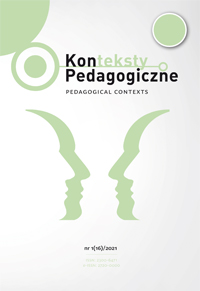Abstract
The situation of people with disabilities, including people with hearing impairment, throughout the history of mankind has been extremely difficult due to the marking of their possibilities through the prism of the consequences of disability and the legal regulation of the rights of people with disabilities. Currently, when it comes to the rights of such people, we are dealing with their formal regulation. Adopted by the United Nations in 2006, the “Convention on the Rights of Persons with Disabilities” is the document which brought people with disabilities the rights accepted by the international community, as well as the respect of such rights by the governments of countries that have signed and ratified the Convention. The Polish government signed the Convention in 2006 and ratified it in 2012. Unfortunately, the rights of people with disabilities included in the Convention are not always properly respected, hence the article presents the opinion of the community of people with hearing disabilities on the given subject and proposals for actions to implement the provisions of the Convention.
References
Nowacka, D. (2018). Raport środowiskowy – środowisko osób z niepełnosprawnością słuchu. Wdrażanie Konwencji o prawach osób niepełnosprawnych – wspólna sprawa. Warszawa: Polskie Forum Osób Niepełnosprawnych.
Podgórska-Jachnik, D. (2008). Historia wychowania i edukacji głuchych z perspektywy surdopedagogiki początku XXI wieku. W: J. Błeszyński, D. Baczała i J. Binnebesel (red.), Historyczne dyskursy nad pedagogiką specjalną – w ujęciu pedagogicznym (s. 119–161). Łódź: Wydawnictwo Naukowe Wyższej Szkoły Edukacji Zdrowotnej.
Szczepankowski, B. (1999). Niesłyszący, głusi, głuchoniemi. Wyrównywanie szans. Warszawa: Wydawnictwa Szkolne i Pedagogiczne.
Tomaszewski, P., Kotowska, K. i Krzysztofiak, P. (2017). Paradygmaty tożsamości u g/Głuchych: przegląd wybranych koncepcji. W: E. Woźnicka (red.), Edukacja niesłyszących – wczoraj, dziś i jutro (s. 111–153). Łódź: Wydawnictwo Akadami Humanistyczno-Ekonomicznej.
Zaorska, M. (2002). Edukacja akademicka osób z uszkodzonym słuchem – szansą czy iluzją szansy na normalne życie. W: E. Górniewicz i A. Krause (red.), Dyskursy pedagogiki specjalnej. Od tradycjonalizmu do ponowoczesności (s. 340–347). Olsztyn: Wydawnictwo Uniwersytetu Warmińsko-Mazurskiego.
Zaorska, M. (2004). Psychopädagogische Frühdiagnose des hörgeschädigeten Kleinkindes. W: U. Hoesch (red.), Frühe Dialoge. Früherzehung hörgeschädigter Säuglinge und Kleinkinder (s. 99–109). Hamburg: Verlag Hörgeschädigte Kinder.
Zaorska, M. (2020a). Kliniczne problemy dzieci z zaburzeniami zmysłów. W: I. Grzegorzewska, L. Cierpiałowska i A.R. Borkowska (red.), Psychologia kliniczna dzieci i młodzieży (s. 625–639). Warszawa: PWN.
Zaorska, M. (2020b). Medyczne i psychologiczne aspekty edukacji Głuchych. Olsztyn: Uniwersytet Warmińsko-Mazurski (maszynopis, tekst w druku).
Konwencja o Prawach Osób Niepełnosprawnych (2006), Dz.U. 2012, poz. 1169.
Powszechna Deklaracji Praw Człowieka (1948),http://www.unesco.pl/fileadmin/user_ upload/pdf/Powszechna_Deklaracja_Praw_Czlowieka.pdf [dostęp: 7.09.2020].
Rezolucja 48/96 Rady Unii Europejskiej i przedstawicieli rządów państw członkowskich, zebranych w Radzie z dnia 17 marca 2008 roku w sprawie sytuacji osób niepełnosprawnych w Unii Europejskiej (2008), https://eur-lex.europa.eu/LexUriServ/ LexUriServ.do?uri=OJ:C:2008:075:0001:0004:PL:PDF [dostęp: 7.09.2020].
Standardowe Zasady Wyrównywania Szans Osób Niepełnosprawnych ONZ (1994). Nowy Jork: ONZ.
Wytyczne dla działań w zakresie specjalnych potrzeb edukacyjnych (1994). Salamanka: UNESCO.
In accordance with the recommendation of the Ministry of Science and Higher Education, which aims to counteract the practice of “ghostwriting” and “guest authorship,” all authors submitting their text for publication should attach an author’s statement which declares the contribution of each of the authors to the article. The printed and signed statement should be delivered by mail or other means to editor-in-chief Joanna Skibska or sent in the form of a scan to the following e-mail address: redakcja@kontekstypedagogczne.pl. The authors will not receive remuneration for publishing their papers. The editors reserve the right to make minor editorial changes to the articles which will not affect the substance of the article. We encourage all authors to prepare their articles in accordance with the guidelines for manuscript preparation. Download pdf file.
Authors transfer all copyrights and grant the journal the right of first publication with the work simultaneously licensed under a Creative Commons Attribution License that allows others to share the work with acknowledgement of the work's authorship and initial publication in this journal. All authors agree to the publishing of their email addresses, affiliations and short bio statements with their articles during the submission process.

